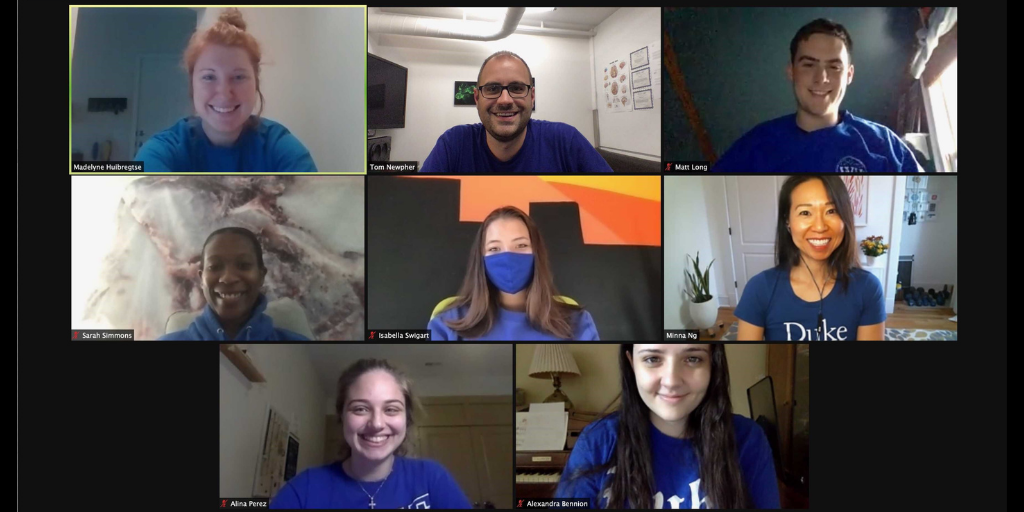Teaching and Learning Before and During a Pandemic
Project Team

Team profile by Matt Long
Across the world, students’ learning experiences have been altered dramatically by the COVID-19 pandemic. Consequently, so has the work of our Bass Connections team; this year, we found ourselves in a position to make some unique and important observations about teaching and learning before and during a pandemic. Our focus is on the experience of students enrolled in STEM courses, in which the rigor of the coursework and intensity of the class could affect student well-being. Prior research shows that a greater sense of belonging in class improves student outcomes, including retention and overall success.
According to a report of Duke’s undergraduate students in Fall 2020, conducted by the Office of Undergraduate Education, students felt most alone in the classroom. But is this an effect of the pandemic? Our team aimed to investigate this. By comparing sense of belonging among students in courses taught pre-pandemic in Fall 2019 and during the pandemic in Fall 2020, we could quantify any differences and explore contributing factors.
In Fall 2020, we distributed a survey that asked students about perceived course dynamics, such as instructor support, competitiveness, and sense of belonging. To gain a richer understanding of the class environment and structure, we also distributed a survey for faculty members about the structure of their course. These were designed by the previous Bass Team who distributed and collected responses for Fall 2019.
This Spring 2021, our team began a data analysis blitz. We compared responses from both surveys, from Fall of 2019 and Fall of 2020, to elucidate trends between years and dig deeper into course characteristics. Our main findings were profound: we found a staggering decrease in overall sense of belonging from 2019 to 2020. We also found that this significant drop in Fall 2020 was associated with students’ perception of instructor support, feeling of competitiveness, and student class standing. This was not the case in Fall 2019. As we enter a new age of teaching and learning after this pandemic that will likely include online, in-person, and hybrid classroom environments, we believe that prioritizing a sense of belonging is more important than ever. It is crucial for instructors to acknowledge and ameliorate the factors that contribute to decreased sense of belonging for online students and to place a special emphasis on being supportive and available, especially to younger students.
Our team’s challenges this semester mainly stemmed from the analysis of our data. Specifically, we had many conversations about how to interpret the variable reports of students and instructors regarding course structure. One of our original goals was to understand how it affects student success. Although we weren’t able to make any conclusions about that this year, we have a strong footing for continuing analysis. Our main success was our ability to capitalize on this opportunity to make data-driven conclusions about the dynamics of classes before and during a pandemic.
Our findings culminated in a research poster entitled “Student Sense of Belonging in STEM: Before and During COVID-19”. It was accepted by a national teaching conference, the Lilly Conference on Teaching and Learning, and will be presented by three undergraduate student team members this May. We also presented our research at the Bass Connections in Education and Human Development (EHD) 6th Virtual EHDx and the 2021 Fortin Foundation Bass Connections Virtual Showcase.
Student Sense of Belonging in STEM: Before and During COVID-19
Poster by Madelyne Huibregtse, Nicole Santeiro, Alexandra Bennion, Matthew Long, Alina Perez, Sarah Simmons, Isabella Swigart, Taylor Braswell, Benjamin Thier, Clarke Shead, Junette Yu, Thomas Newpher, Minna Ng and Dorian Canelas

